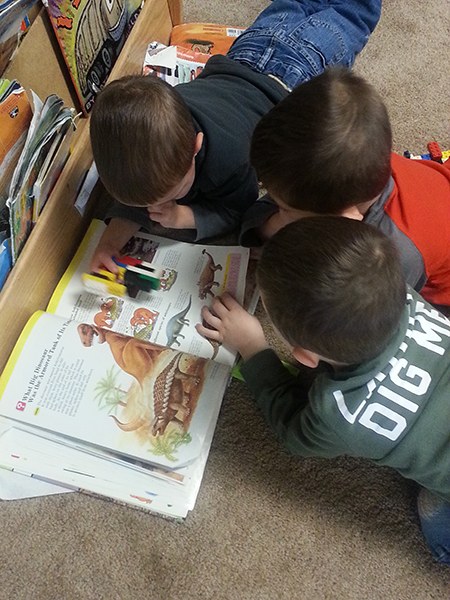Posted: March 12, 2020
Learning to read is one of the most important childhood skills and can provide children with a tremendous sense of enjoyment. A wealth of research has established the importance of early literacy skills for later school readiness and long-term school success.

Children who begin kindergarten behind their peers in literacy and reading skills often have a tough time catching up as early literacy skills have been shown to predict reading ability throughout school, likelihood to graduate high school and attend college, and future career opportunities. Additionally, reading and literacy challenges often co-occur with behavioral challenges. Possessing the language skills to describe how you are feeling is a key aspect of social-emotional adjustment. As such, encouraging literacy skills early can also promote positive social-emotional development and minimize behavioral challenges.
Building literacy skills
There are multiple things that you can do as an educator to encourage early literacy skills. Think about your classroom environment. Are there letters and words easily viewable to children? Are children's books readily available? Try your best to create an environment where children are surrounded by language in a fun and age-appropriate manner.
While teaching the alphabet and print awareness is important, what is even more essential is phonological awareness--the ability to recognize that language is made up of sounds. For example, it is important that children are not only able to identify the letter "b," but also understand that the letter represents the specific "buh" sound. It is really the ability to string together these phonological sounds that set children up to read successfully. You can promote phonological awareness in many different ways in your classroom. Rhyming and alliterative games and stories and clapping to identify different syllables are fun ways to build phonemic awareness. Or try identifying a letter sound and asking children to find as many objects in the classroom that begin with that same sound.
Reading out loud to the children in your classroom is a great way to promote literacy and language skills; however, it is also important to think about how you are reading. Try to make the experience interactive. For example, asking children for their input on the story helps them comprehend what you've read and grasp that words are not just collections of letters but have specific meanings. Here are some things you could try asking: "What do you think this character is feeling here?" "Why do you think this character did that?" "What do you think is going to happen next?"
Encouraging a lifelong love of reading
The benefits of reading extend beyond language and literacy skills. Reading books can encourage children to be intellectually curious, inspire problem solving, promote empathy, increase self-esteem, and help them understand the world and connect with people around them. Here are some strategies for encouraging a love of reading:
- Allow children in your class to select and read the books they are interested in. Because of this, it is important children have options that represent the diversity in our world. Having books with diverse characters allows children to identify and connect with the characters and promotes understanding of different experiences.
- Try to set up your classroom with a comfortable area that is designated for reading. This could be an area with big, comfortable pillows, or maybe just a specific area on the rug by the classroom library.
- Develop reading routines. Designate a specific time in the day that is reserved for reading. This could be individual reading or a time when you read aloud.
- Promote connection through reading. This can be done through partner reading, encouraging interaction when you read aloud, or you showing an interest in the book a child is reading.
Ultimately, it is important that children develop a love of learning and are motivated to read on their own. This is very hard to do if we do not create an environment that encourages reading in a relaxed manner. Reading should be viewed as an enjoyable experience, not a stressful one. If a child is struggling, remain supportive, encouraging, and non-judgmental. And with many things, children in your classroom will look to you as an example. If you convey a positive relationship with reading and it appears to be something you enjoy, it is more likely that the children around you will adopt a similar attitude.
Roald Dahl's book Matilda beautifully sums up the potential benefits that accompany building literacy skills and fostering a love of reading in this excerpt: "So Matilda's strong young mind continued to grow, nurtured by the voices of all those authors who had sent their books out into the world like ships on the sea: These books gave Matilda a hopeful and comforting message: You are not alone."
For more information on promoting early literacy skills in your classroom please check out the following Better Kid Care online modules:
- "Preschool Foundations: Environments and Routines that Work!"
- "School Readiness: Lay the Foundation in the Early Years"
- "Connecting to Military Children through Books"
Download and share a PDF of this article with others!
Article by Benjamin Bayly

